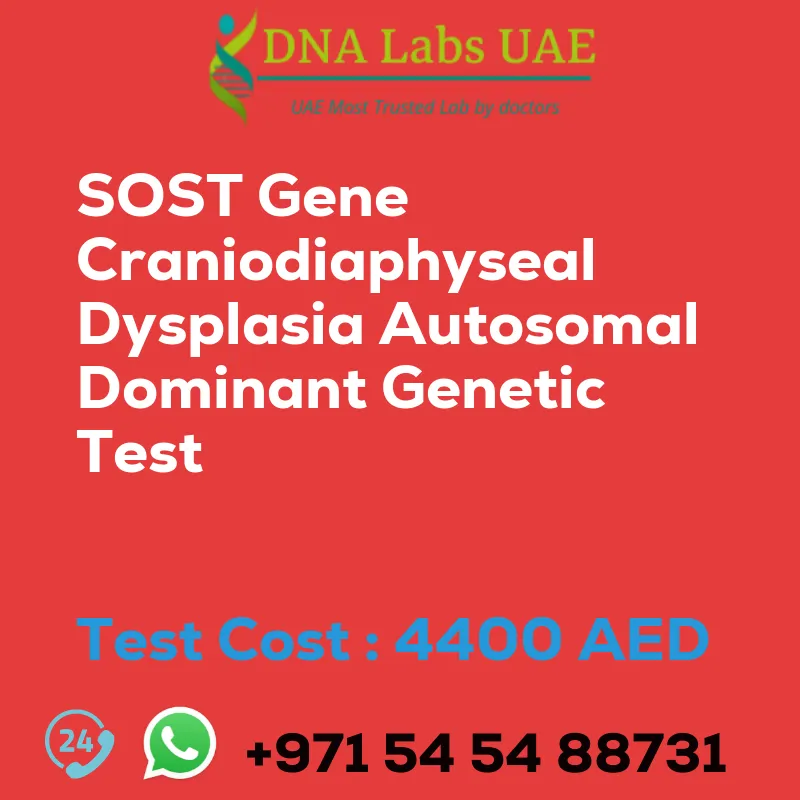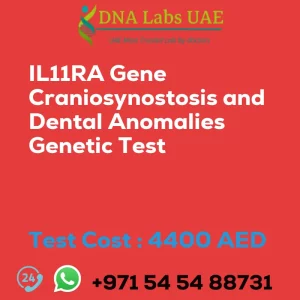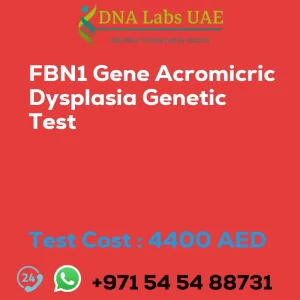SOST Gene Craniodiaphyseal Dysplasia Autosomal Dominant Genetic Test
Welcome to DNA Labs UAE’s blog on SOST Gene Craniodiaphyseal Dysplasia Autosomal Dominant Genetic Test. In this blog, we will provide detailed information about the test, including its components, price, sample condition, report delivery, method, test type, doctor, test department, pre-test information, and test details.
Test Details:
The SOST gene craniodiaphyseal dysplasia is a rare genetic disorder that is inherited in an autosomal dominant manner. This means that an affected individual has a 50% chance of passing the condition on to each of their children.
NGS (Next-Generation Sequencing) genetic testing is a type of genetic test that uses advanced sequencing technologies to analyze multiple genes simultaneously. In the context of craniodiaphyseal dysplasia, NGS testing can be used to identify mutations or variations in the SOST gene, which is responsible for this condition.
NGS genetic testing involves collecting a DNA sample, usually through a blood or saliva sample, and then sequencing the DNA to identify any variations or mutations in the SOST gene. This can help confirm a diagnosis of craniodiaphyseal dysplasia and provide information about the specific genetic changes causing the condition.
Genetic testing can be helpful for individuals with symptoms of craniodiaphyseal dysplasia, as well as their family members who may be at risk of inheriting the condition. It can provide valuable information for medical management, genetic counseling, and family planning decisions.
It is important to consult with a healthcare professional or genetic counselor to discuss the appropriateness and availability of NGS genetic testing for craniodiaphyseal dysplasia. They can guide you through the process, explain the potential benefits and limitations of testing, and help interpret the results.
Test Name: SOST Gene Craniodiaphyseal Dysplasia Autosomal Dominant Genetic Test
Components: NGS Technology
Price: 4400.0 AED
Sample Condition: Blood or Extracted DNA or One drop Blood on FTA Card
Report Delivery: 3 to 4 Weeks
Method: NGS Technology
Test Type: Dysmorphology
Doctor: Pediatrics
Test Department: Genetics
Pre Test Information:
Clinical History of Patient who is going for SOST Gene Craniodiaphyseal dysplasia, autosomal dominant NGS Genetic DNA Test. A Genetic Counselling session to draw a pedigree chart of family members affected with SOST Gene Craniodiaphyseal dysplasia, autosomal dominant NGS Genetic DNA Test gene SOST.
Thank you for reading our blog on SOST Gene Craniodiaphyseal Dysplasia Autosomal Dominant Genetic Test. If you have any further questions or would like to schedule a test, please contact DNA Labs UAE.
| Test Name | SOST Gene Craniodiaphyseal dysplasia autosomal dominant Genetic Test |
|---|---|
| Components | |
| Price | 4400.0 AED |
| Sample Condition | Blood or Extracted DNA or One drop Blood on FTA Card |
| Report Delivery | 3 to 4 Weeks |
| Method | NGS Technology |
| Test type | Dysmorphology |
| Doctor | Pediatrics |
| Test Department: | Genetics |
| Pre Test Information | Clinical History of Patient who is going for SOST Gene Craniodiaphyseal dysplasia, autosomal dominant NGS Genetic DNA Test. A Genetic Counselling session to draw a pedigree chart of family members affected with SOST Gene Craniodiaphyseal dysplasia, autosomal dominant NGS Genetic DNA Test gene SOST |
| Test Details |
SOST gene craniodiaphyseal dysplasia is a rare genetic disorder that is inherited in an autosomal dominant manner. Autosomal dominant means that an affected individual has a 50% chance of passing the condition on to each of their children. NGS (Next-Generation Sequencing) genetic testing is a type of genetic test that uses advanced sequencing technologies to analyze multiple genes simultaneously. In the context of craniodiaphyseal dysplasia, NGS testing can be used to identify mutations or variations in the SOST gene, which is responsible for this condition. NGS genetic testing involves collecting a DNA sample, usually through a blood or saliva sample, and then sequencing the DNA to identify any variations or mutations in the SOST gene. This can help confirm a diagnosis of craniodiaphyseal dysplasia and provide information about the specific genetic changes causing the condition. Genetic testing can be helpful for individuals with symptoms of craniodiaphyseal dysplasia, as well as their family members who may be at risk of inheriting the condition. It can provide valuable information for medical management, genetic counseling, and family planning decisions. It is important to consult with a healthcare professional or genetic counselor to discuss the appropriateness and availability of NGS genetic testing for craniodiaphyseal dysplasia. They can guide you through the process, explain the potential benefits and limitations of testing, and help interpret the results. |








